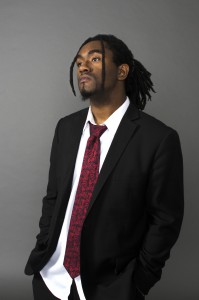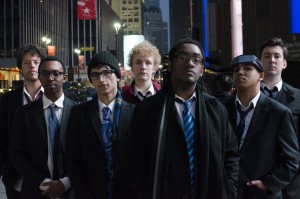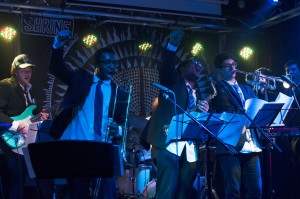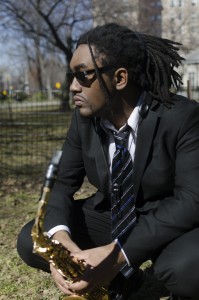JQ Magazine: JQ&A with Patrick Bartley of J-MUSIC Ensemble

“When it comes to art, there’s always a certain level of intensity that I like, because I like seriousness—especially when it comes to an almost religious seriousness in doing music or art for a higher presence. I love that about Japanese aesthetics.” (Armando Zamora)
By Rashaad Jorden (Yamagata-ken, 2008-10) for JQ magazine. A former head of the JETAA Philadelphia Sub-Chapter, Rashaad is a graduate of Leeds Beckett University with a master’s degree in responsible tourism management. For more on his life abroad and enthusiasm for taiko drumming, visit his blog at www.gettingpounded.wordpress.com.
People from all over the world come to New York to launch their careers in entertainment. But can you do so in the world of Japanese music?
Patrick Bartley has. A Florida native who was inspired at a young age by the sounds of classic video game scores like Sonic the Hedgehog and Streets of Rage, Bartley came to New York to study at the Manhattan School of Music and later formed the J-MUSIC Ensemble, an multi-instrumental group that mixes the various genres that make up the Japanese music scene. A Grammy-nominated saxophonist and composer with a jazz background, Bartley formed the group as a way to express his admiration for the music he first discovered through video games, anime themes and J-pop classics.
The J-MUSIC Ensemble is currently recording their debut album, and their numerous live performances over the past year have led to this week’s release of the band’s first-ever single, FUTUREBOUND, available May 6. The group is celebrating with a special launch party performance that night at Shrine World Music Venue in Manhattan, followed by a performance at ShapeShifer Lab in Brooklyn May 8 with Tokyo electronic music pioneer Coppé and recording artist Kaoru Watanabe.
Keeping busy as a fulltime musician, Bartley has performed with artists as diverse as Wynton Marsalis, Steve Miller and Igor Butman, and earlier this year he bantered on-camera with Stephen Colbert for a taping of The Late Show as a guest with house band Jon Batiste and Stay Human. En route to another gig earlier this year, JQ caught up with him over falafel in Harlem for this exclusive interview.
What should readers know about the J-MUSIC Ensemble?
Even though we feature singers, when you go to a J-MUSIC Ensemble concert, you’re going to experience the music you’re used to hearing in a totally different way, because we put the horns in the front line in the same positions as singers. We want you to feel the horns just as powerfully as you would hear the other elements like the dancing and the singing. But this time, you’re putting the music under a microscope and really giving you the full experience. We’re also taking these songs and putting improvisational elements into it—we’re taking a microscope and putting jazz elements into it. But at the same time, we’re keeping the core essence of the music. We’re not just playing jazz songs; we’re taking the jazz mentality. We’re still playing rock. We’re still playing funk. We’re still playing pop. We still feel that exact feeling, but with a human element—live instruments and live bands performing it. There’s really nothing like it.
What projects are you and the J-MUSIC Ensemble working on at the moment?
The most recent thing we’re excited about is our single release on May 6. With this, people can finally get real, downloadable audio files to keep with them no matter what, and in high quality! We spent a great deal of time and invested a lot to get this working, and the mixes and masters turned out great. Other than this, the band itself is really the project. The way I think of this, project-wise, is I’m constantly looking at this huge, vast sea of Japanese music, art, and cultural history—and I often find myself asking the question, “Where do I start?” So, in that regard, I usually pick what I think can work best for the band, so that we can spend time developing our sound and finding what our natural tendencies are, you know? As well as just what the optimal horn sounds are, and if stuff is electronic, I have to figure out what’s possible to play live with real instruments. Right now, we’ve found that [J-pop band] Perfume is perfect for our instrumentation, so we’re going to keep exploring that, mainly, until we continue to find our sound.
How has Japan influenced your music?
The way Japan has influenced my music has been through understanding the history of the country. And even though I really haven’t gone there, I observe as much as I can, such as the intensity by which they operate on a day-to-day basis in everything. When it comes to art, there’s always a certain level of intensity that I like, because I like seriousness—especially when it comes to an almost religious seriousness in doing music or art for a higher presence. Like actually taking it seriously and creating something that no matter what creates deep emotions and passions.
I love that about Japanese aesthetics. That always has touched me and I think I’ll never really forget it. And then there’s the language, too. It’s a totally different way of thinking, so it’s influenced the way I think about rhythm.
How will learning Japanese improve you as a musician?
Since I’m a jazz musician, the way we swing is a little different from the way they synthesize rhythm. The swing naturally comes from a combination of several different linguistic dialects. The bounce in the way we speak in the Southern dialect combined with the fast paced nature of the North breeds a unique mesh of talking. But in Japan, there’s a monophthong system, and every consonant is followed by a vowel. And what that creates is something that’s more akin to binary forms of rhythm instead of triplets. The phrases might be longer, more lucid and fluid [in Japanese] and you can move them around.
[Learning Japanese] also helps me to understand the lyrics and why certain chords are chosen, why certain melodies are chosen, for it to bring out a certain feeling of a certain lyric. You can get the meaning of a song [through Google Translate] but you really won’t get how it feels to listen to it and know exactly what they’re saying as you’re hearing it. So that’s how it’s really helping me as a musician.
What are the differences between American and Japanese music?
Before the early 1900s, the only music that was played in Japan was mostly traditional Japanese music. Up to the late 1800s, America was already forming its own popular music through folk elements and Western classical musical elements through the African diaspora. As for Japanese music, the popular music now came from the traditional Japanese melodies and traditional Japanese rhythms from gagaku (court music) or even smaller folk circles.
Jazz had always reached Japan via American exports like Louis Armstrong and Duke Ellington. They were hearing this music but because they weren’t delving into the American experience, they could only experience this music through the filter of their own experiences. What that comes out sounding like is usually is a different flow from what we’re used to. But the difference is once you have a newer generation of musicians who start going over to America and experience what’s happening over here, they end up having a deeper experience with the music they like than if they just stayed in that country. And now what you have is a fusion of really interesting music combinations—the Japanese spirit/soul with the American musical essence of improvisation. I think that’s probably the biggest difference; you have to be in a place in order to really experience it. I hope to go over to Japan so I can get a more holistic experience of that music instead of just being an outsider.
If all goes well, when will the J-MUSIC Ensemble perform in Japan?
We have videos and other recordings on YouTube now, but we don’t have an actual album out yet. Once we get that album out—probably sometime in the fall—we’ll push it over into Japan and other international markets because people will actually have something they can listen to and play on the radio. Once that happens, we’ll be able to syndicate it better and push it out to larger audiences. The artists we really want to see and meet will be able to hear our stuff, and then, who knows—maybe we can do some collaborations, maybe [performances at] some clubs will happen. Once we get enough shows, we’ll be able to do that.
What challenges have you faced in trying to establish yourself in the Japanese market?
I haven’t really gotten into the Japanese market yet. The only reason why is because of the language barrier. That’s why I’m taking classes at Japan Society to prepare myself better for conversations, reading, translations, etc., so when I post my stuff online I can reach wider audiences who may not speak English but still love the music. And then, obviously having places to perform. The more places we have to perform in the city first, the more opportunities for people to come out and see what we’re doing so that instead of hearing out about us online will help people feel the energy of our performances. And that will help us gain more traction.
Who are the musicians you are most eager to collaborate with?
I would love to perform with Perfume. They used to perform with a live band back in their formative years, but I don’t think they do that anymore because their direction has changed. Maybe at least they’ll hear what we’re doing and belt out one of their classics for us to perform. That would be really cool. And they are other musicians like sasakure.UK, who’s an incredible visual artist and musician. It would be cool to do some electronic stuff with him.
Earlier this year, you were fortunate enough to perform on Steven Colbert. How did you land the spot?
The opportunity came about from having met Jon Batiste, the musical director for the show, several years before. He performed at the Harlem Jazz Museum with [drummer and percussionist] Bobby Sinabria, one of the most influential people in my life to date, who leads an Afro-Cuban Latin jazz orchestra that I was a part of for four years when I was at the Manhattan School of Music. I met Jon when I got a chance to play with them there. I was playing and Bobby told me to go into the circle because I knew the song “Tico Tico no Fuba,” so I went in there and I started playing a little bit. From that point, they knew who I was. I was playing at Dizzy’s (a jazz club in New York) and other random places until I got called to do this gig by his manager.
His manager was calling me to come out to different parties within several months. It wasn’t until November 2014 that I was actually able to do a gig with him. And so from that point, I did that gig and another gig in St. Louis. And it wasn’t until he gave me a call last spring, letting me know that he might be getting that spot on The Late Show. I got a call from his manager in the summer saying that Jon might want you to be playing with him on The Late Show and be ready for the call. I’m like, “Okay, I’m always going to be ready. I’m always going to be down for that.” It was January 14 and 15 that I had my first bits there, and I did a whole week from February 22 to 26 and February 29 and March 1 of this year.
Those were crazy experiences. I did everything from playing a Chinese classical instrument on the show for Olivia Munn to playing J-pop because I was able to introduce Jon to the fact that I was into Japanese music when we did that first gig.
How have musicians received the fact that you play Japanese music?
When I play with these musicians, they understand that I have a grasp of the tradition [in jazz music], like in jazz and Western music. Their ears and eyes are more open to what I have to say. They’re very open to things in general because they’re jazz musicians and artistic people. So when I introduce the idea of Japanese music, they’re kind of bouncing it back with their ideas and prior experiences musically. And they can hear the soul and what I’m going into. That’s great for me—it’s a gateway to my personal expression because this has always been something I’ve really wanted to do. Overall, I’ve been really happy with the reception.
Finally, what are your plans for the summer?
J-MUSIC Ensemble plans on releasing our full-on album during the summer, but I don’t want to talk too much about that just yet. We’re also getting a great opportunity to play at the Liberty City Anime Con in Times Square in August! I believe there’ll be more on that whenever they decide to release more info. As for myself, outside of J-MUSIC, I’ll be playing in various places around New York, in addition to going to France at the beginning of August with Wynton Marsalis to play a week with him. The summer can be pretty rough for musicians, usually left up to festivals and stuff like that. I’m sure things will pick back up!
FUTUREBOUND is available online May 6. For more on J-MUSIC Ensemble and upcoming performances, visit www.jmusicband.com.
For more JQ magazine interviews, click here.





Comments are closed.